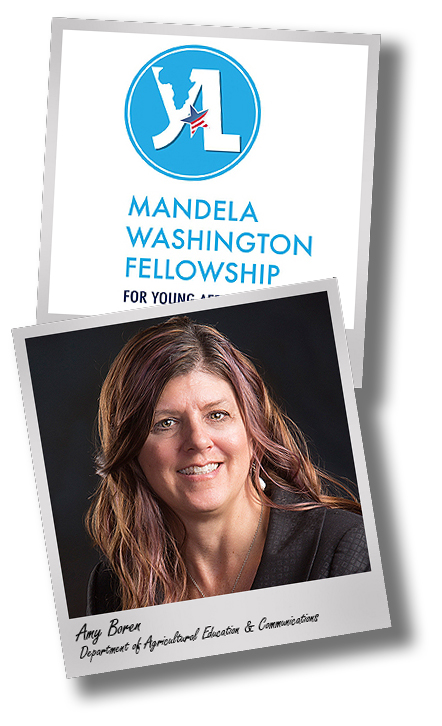Texas Tech to host group of young African leaders starting in mid-June

Texas Tech University has been selected as an Institute Partner for the 2017 Mandela Washington Fellowship for Young African Leaders. Beginning in mid-June, the university will host 25 bright, emerging African leaders for a six-week academic and leadership institute sponsored by the U.S. Department of State.
"Our institutional, five-year Quality Enhancement Plan is to communicate in a global society, and we felt hosting 25 young leaders selected from several different countries in sub-Saharan Africa was a great way to support this goal," said Amy Boren, an assistant professor in the Department of Agricultural Education & Communications. "Texas Tech is a world-class institution that can offer a unique cultural and academic experience to the Mandela Washington fellows."
A $150,000 grant has been awarded to the university to fund a Public Management Academic and Leadership Institute for the fellows from June 16 to July 30. After a competitive proposal process, Texas Tech was one of just 38 U.S. colleges and universities chosen for the program.
Created in 2014, the Mandela Washington Fellowship is the flagship program of the Young African Leaders Initiative (YALI) and empowers young African leaders through academic coursework, leadership training and networking opportunities. YALI was created by President Barack Obama in 2010 and aims to support the growth and prosperity of young African leaders, strengthen democratic governance and increase peace and security across Africa.
The cohort of fellows hosted by Tech will be part of a larger group of 1,000 Mandela Washington fellows studying at institutions across the United States this summer. The fellowship program welcomes African civic, business and community leaders between the ages of 25 and 35 to U.S. universities and colleges and gives them access to free online courses in topics like climate change, entrepreneurship and human rights.
"It's important to note the fellows are not students," Boren said. "They are young leaders in their home countries who were among 64,000 applicants to the fellowship program."
Fellows are from every country in sub-Saharan Africa and have established records of accomplishment in promoting innovation and positive change in their organizations and communities. All of the applicants chosen are fluent in English and proven community leaders as assessed by the U.S. embassies in their countries. The selection process is stringent, Boren said, with less than 2 percent of all program applicants being chosen for the fellowship.
"The fellows are the best of the best in their countries," Boren said. "We are honored to host these rising stars at Texas Tech in an executive-style education program focused on enhancing the leadership and service skills they already have demonstrated."
Boren said faculty and staff from several areas, including the Office of International Affairs, Tech's Department of Agricultural Education & Communications and the Educational Psychology and Leadership graduate program in the College of Education, are involved in the planning and logistics of the institute.
Working closely with the state department and its implementing partner, the International Research & Exchanges Board (IREX), Institute Partners have designed programs that will challenge, inspire and empower the young leaders. During the application process, partners chose between three types of institutes:• Business and Entrepreneur Institutes that cater to entrepreneurial fellows and those aspiring to become leaders in the private sector• Civic Leadership Institutes for fellows who serve though nongovernmental agencies, community-based organizations or volunteerism, and• Public Management Institutes for fellows working or hoping to work in government, regional or international organizations and other publicly minded groups and think-tanks.
"We elected to go with the public management track because my fellow faculty members and I have worked extensively with public institutions in African and Latin-American countries," Boren said. "We felt we had a better grasp of the issues in this sector than in the others."
Written by Amanda Castro-Crist
CONTACT: Amy Boren, Assistant Professor, Department of Agricultural Education & Communications, Texas Tech University at (806) 834-7273 or amy.boren@ttu.edu
0222NM17 / For full text of the story produced by TTU Communications and Marketing, click here
Davis College NewsCenter
-
Address
P.O. Box 42123, Lubbock, Texas 79409-2123, Dean's Office Location:Goddard Building, Room 108 -
Phone
(806)742-2808 -
Email
kris.allen@ttu.edu
